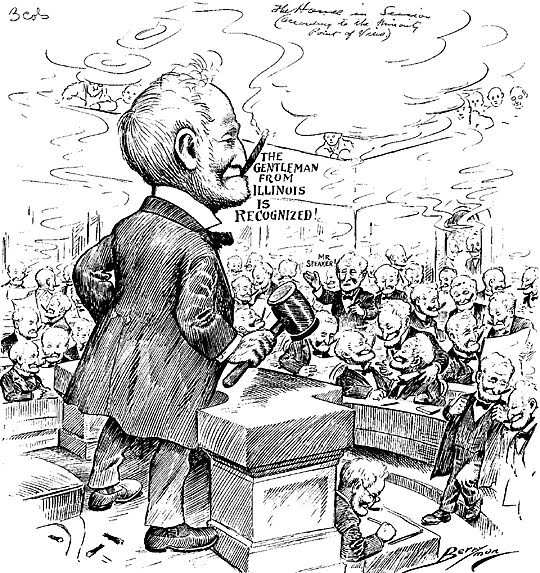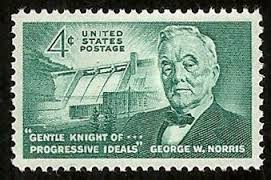|
By Ray Smock The Rules of the U. S. House of Representatives provide a device to remove a Speaker from his job. Last week a member of the House, Mark Meadows (R-NC) filed a motion to vacate the chair which would challenge the leadership of Speaker John Boehner (R-OH) and call for a new election for the speakership. As I write this there is no way to know if this is a minor tempest in a teapot or not. But the timing of the resolution and the fact that it was referred to committee and not brought up as a privileged resolution is a good indication it may go nowhere. But theresolution itself shows how one member, at least, feels about Speaker Boehner’s leadership. Click here to read the article from The Washington Post Reporters have been asking how common such a motion has been in House history and if it has ever been used before. The closest example in history occurred 105 years ago when Speaker Joseph Gurney Cannon (R-IL) had his leadership challenged by a member of his own party George W. Norris (R-NE). But the circumstances were not exactly the same. On St. Patrick’s Day, March 17, 1910, and running for two days, the progressive wing of the Republican Party staged a successful revolt against the strong authoritarian rule of Speaker Cannon. “Uncle Joe,” as everyone called him, wielded more power than any other speaker, with the possible exception of his predecessor Thomas Brackett Reed (R-ME). Both Reed and Cannon were often referred to as “Czars” for their dictatorial styles and centralized control of House procedures. Reed was famous for his “Reed’s Rules,” which strengthened the majority party’s control of the House and ended obstructionist tactics from the minority party. During Cannon’s speakership from 1903 to 1911 he had broad powers to appoint committee chairs and to completely control the Rules Committee with his hand-picked lieutenants. Cannon was a conservative Republican who blocked the rising tide of progressivism that was growing in both major parties. Progressivism got a substantial boost from Theodore Roosevelt’s presidency beginning in 1901. By 1910, the progressive Republicans, led by George Norris, were tired of Cannon’s stranglehold on the legislative process and they staged a coup. Norris did not introduce a motion to vacate the chair, thus calling for a new vote on who should be Speaker. Instead, Norris introduced a resolution designed to strip Speaker Cannon of his broad authority to appoint the Rules Committee, calling for the members of the House to elect the Rules Committee. Losing control of the Rules Committee would be tantamount to stripping Speaker Cannon of his control, while leaving him in office. Cannon chose to fight the battle out on the floor, delaying the vote long enough to round up members loyal to him, some of whom were absent because of St. Patrick’s Day festivities. Speaker Cannon ruled that Norris’s resolution was out of order. Cannon declared that Norris’s resolution violated House rules. When the House voted to sustain the Speaker’s ruling, Cannon was surprised to find that he lost 182-163, with the Republican progressives and the Democrats having enough votes to defeat the Speaker’s ruling. This vote then paved the way for the vote on Norris’s resolution to strip the Speaker of his control of the Rules Committee. Again Cannon lost, this time 191-152.
Then the House followed with a resolution to vacate the office of Speaker and elect a new one. Cannon had already been defeated and there was no stomach to humiliate him further, and the motion to vacate failed by 155-192. Cannon remained as Speaker for another year, only to lose his seat in the House in the election of 1912, which saw Democrat Woodrow Wilson elected president and the House changing to a substantial Democratic majority in that election. The Republican Party was badly split in 1912, with William Howard Taft getting the Republican nomination, Theodore Roosevelt running on the “Bull Moose” ticket, and even Joe Cannon got a few votes at the convention for the presidency that year. Uncle Joe Cannon was out but not finished. Two years later in the 1914 elections he won his House seat back and served in Congress until 1923. His adversary in the revolt against his power, George Norris, became a prominent progressive and a rising star in politics elected to the U.S. Senate in 1912 and serving for the next 30 years, where he was universally recognized as one of the greatest senators in the history of the Senate, with his most famous legacies being the 20th Amendment to the Constitution and his leadership in establishing the Tennessee Valley Authority. Comments are closed.
|
Welcome to the Byrd Center Blog! We share content here including research from our archival collections, articles from our director, and information on upcoming events.
Categories
All
Archives
July 2023
|
Our Mission: |
The Byrd Center advances representative democracy by promoting a better understanding of the United States Congress and the Constitution through programs and research that engage citizens.
|
Copyright © Robert C. Byrd Center for Congressional History and Education
|



 RSS Feed
RSS Feed
